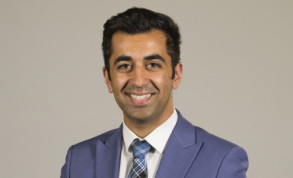Health and social care are top of spending plans
In Scotland, the Budget proposes to take 2022/23 health and social care spending to £18bn, £805m more than the restated budget for 2021/22. Capital spending will rise by £25m compared with the restated budget.
Covid funding has not been included in the spending plan as the government is waiting for further details promised in the spending review by the UK Treasury.
The Scottish Budget outlined plans for spending at the front line. Initial additional funding of £559m will be allocated to NHS boards in 2022/23, while £232m has been earmarked for the national treatment centres and to address waiting times.
Funds have also been set aside for primary and social care, and integration. The Budget document said a £1.6bn investment in social care and integration will lay the groundwork for the National Care Service, and includes a transfer of almost £847m to local government.
Health secretary Humza Yousaf (pictured) said the investment was vital to Scotland’s recovery from Covid-19, and to ensuring staff and carers are properly recognised.
‘Our priority for social care is the creation of the National Care Service, but this Budget ensures we do not wait for the service to come into being to continue to drive up standards and quality,’ he said.
‘This Budget will ensure everyone continues to get the care they need, while repaying the efforts of those who are looking after us all.'
In its draft Budget, the Northern Ireland executive moved to three-year allocations for all departments. It allocated the Department of Health almost £22bn between 2022/23 and 2024/25, broken down into £20.84bn in revenue and £1.09bn in capital.
This year the health department’s opening revenue budget was £6.45bn. Under the draft Budget, this would rise to £6.78bn next year, then nearly £6.95bn in 2023/24, and £7.1bn in 2024/25. Health will also receive the first £50m available in the 2022/23 monitoring round.
Finance minister Conor Murphy said his draft Budget prioritised health and social care, a commitment previously made by the executive.
‘The draft Budget proposes prioritising health by providing additional resources to ensure the [funding] bids for the elective care, cancer and mental health rebuild strategies are met in full,’ Mr Murphy said.
‘A health budget of £21bn over the next three years provides a long-awaited opportunity for long-term planning, reforming service delivery, and tackling waiting lists on a sustainable basis.’
However, he said funding from the Westminster spending review fell short of what was needed to support the executive’s priorities, so his draft Budget proposed other departments contribute 2% of their opening baselines to fund health.
These contributions would pay for £523m of a general £1.9bn allocation to be used at the health minister’s discretion to address the significant pressures in the health and care system.
The finance minister added that discussions would be held with the Treasury over the spending profile for the medical school at the University of Ulster’s Magee campus.
A consultation on the draft Budget will be open until 7 March.
Related content
We are excited to bring you a fun packed Eastern Branch Conference in 2025 over three days.
This event is for those that will benefit from an overview of costing in the NHS or those new to costing and will cover why we cost and the processes.